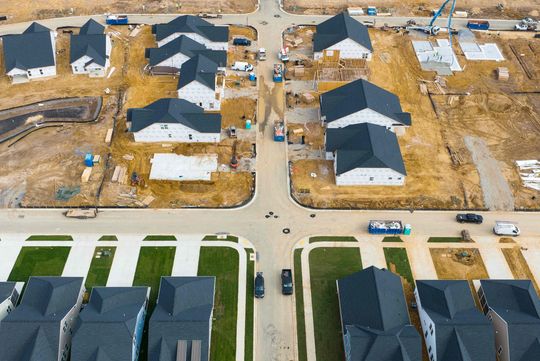Home builders are struggling amid the housing downturn, UBS Analyst John Lovallo tells MarketWatch
It’s a tough time to be selling a home. That’s also true for home builders, who are seeing canceled orders and dwindling interest among would-be buyers.
“Mortgage applications have been running down close to 40% year over year. People are clearly in sort of a wait-and-see or pause mode,” John Lovallo, a UBS UBS, +0.06% analyst who covers home builders, told MarketWatch on an episode of Barron’s Live.
Confidence among home builders dropped for the 10th month in a row in October to a 10-year low (with the exception of the start of the pandemic), according to the National Association of Home Builders. Traffic among prospective buyers, one of the components that measures confidence, fell significantly, the association said, as buyers look at mortgage rates above 7%.
Cancellations by property developers are also up, Lovallo noted. KB Home KBH, -0.35% reported a 35% cancellation rate in the third quarter, up from 9% a year ago. Lennar said 21% of orders are being canceled, while Meritage Homes MTH, +0.05% reported a 30% cancellation rate. Ali Wolf, chief economist at Zonda Research, tweeted Thursday afternoon that her data shows a 70% cancellation rate among builders in Phoenix.
Being able to move into a home within 30 to 60 days helps the buyer when rates are rising, especially as building a home to order could take six to nine months.
As a result, builders have had to get more creative with incentives, including rate locks, rate buydowns and upgrades on kitchen appliances, Lovallo said.
Has it worked? “We’re starting to see some demand elasticity, which is encouraging,” Lovallo said. “There is a tremendous amount of underlying demand for housing that’s still out there.”
While home builders are struggling, larger builders are “faring better,” he said, noting that a builder like D.R. Horton has better economies of scale. “They’re going to be able to buy commodities in bulk [and] have access to capital markets,” he said. “So the larger builders are absolutely in a better position.”
Additionally, builders who offer spec homes built in advance of orders or homes that first-time buyers can move into quickly can better “compete with the existing stock in the market,” he said.
Being able to move into a home within 30 to 60 days also helps the buyer when it looks like rates will keep rising. Building a home to order could take six to nine months. Yet builders also have to contend with big backlogs and need to move inventory fast.
Some builders are offloading inventory to institutions that in turn put the units on the rental market. “The build-for-rent market is going to become increasingly important,” Lovallo said. While it won’t overtake the build-for-sale market, he noted, it “does broaden the pool of buyers.”
Home builder stocks are trading at a fraction of book value, Lovallo said, at about five times earnings.
Home building is ripe for disruption
It’s time home builders explored some innovation, Lovallo told MarketWatch. “Fewer homes were built over the past 14 years” since the 2008 recession, he said, “and the ones that were built were built at higher price points, because that’s where the demand was.”
“The home-building industry is still building homes today the same way they did 100 years ago. They’re stick framing homes on site, lumber is being tossed around,” Lovallo said. “It’s probably the only industry that has not seen technology infused over the past 100 years.”
Constraints on labor, along with bureaucratic red tape related to land and permits, all bog down the process of building homes, he added.
‘The home-building industry is still building homes today the same way they did 100 years ago.’
— John Lovallo, UBS analyst
“There has to be some kind of change that’s brought to this industry,” Lovallo said. “But I would argue that 10 years from now, we’re going to be building homes very differently than we are today.”
Even though builders are seeing cancellations rise, buyers shouldn’t expect home prices to drop significantly, Lovallo advised.
Unlike the global financial crisis of 2008, when home prices fell 30%, Lovallo expects prices to remain relatively stable. Other analysts, though, are predicting big peak-to-trough declines.
Because people will likely continue to work from home “over the foreseeable future,” Lovallo wrote in an Oct. 28 note, home-price appreciation may not decline significantly, barring an external economic shock.

